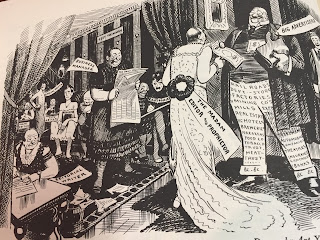(14th Century Italian artist Giotto's depiction of the Holy Family in flight)
Following is a column I've run before during this time of year. The issue it addresses remains with us today.
They were descendants of immigrants who themselves became
immigrants.
Soon after the baby arrived, a dream came to the father that
the little family would have to leave their homeland if they were to survive.
Even the life of an innocent child was in danger in their homeland.
So the three of them—father, mother and child—left their tiny village and embarked on a treacherous journey through the desert wilderness. They were very poor and had little more than the clothes on their backs.
They traveled by day and by night, ever fearful they might
be captured or attacked, until they finally crossed the border. They brought no
documentation with them, only their humility and the father’s willingness to
work hard to support his family.
He was a trained craftsman, good with his hands, and his
work was valued even if he was paid so little he could never hope to rise out
of his poverty. With his teenage wife tending to their baby, he went out among
the people to earn bread and shelter for them.
He heard the whisperings among those in this new land. They
called him and his family foreigners,
outsiders, and even illegal aliens, as if they had come from
the moon and their very existence was something less than human, a violation of
not only the law of the land but also God’s law.
“They’re just here to take our jobs, to feed, house, and
clothe themselves at our expense,” he heard one of them say.
“They don’t even take the time to learn our language,” said
another.
“Why are they even here? Is their own country not good
enough for them? Perhaps they’re spies,” said yet another.
“The way people like these spawn they’ll soon be everywhere,
expecting their new offspring to be treated equally just because they were born
here, like so many little anchors for their illegal parents. Anchor babies,
that’s what they’ll be.”
Some of these whisperings came from the very people who
benefited from his labors. They would say these things as soon as they walked
away from the worksite and rejoined their neighbors and friends. Local leaders
heard the comments, too, and saw an advantage in such fears, prejudice, and
suspicions. So they began to talk among the crowds and, being leaders, talked
loudest of all, loud enough for everyone to hear.
Even some of the priests joined the chorus, invoking God’s
judgment from their pulpits, condemning the strangers for breaking the law and
taking advantage of people’s hospitality.
The father and mother, already homesick, longed for their
faraway families and friends. They knew many did not welcome them in this
strange land, but they also feared for their child’s life if they returned
home. Did their little child have any idea of all the troubles that surrounded
them?
The father remembered how his ancestors had been immigrants
to this very land many generations before and had prospered here, but then a
new leader had turned them into slaves and they had left. Now he and his wife
and child had returned because their own land had become hostile. When would it
all end? Where was there a refuge?
Eventually the father, whose namesake had been a dreamer and
an interpreter of dreams, had yet another dream, and this one told him the time
had come to return home. So he and his wife packed their belongings, wrapped up
their child to keep it warm, and journeyed back to their homeland. They had to
be careful. Dangers still lurked, but at least they were home.
And back in the strange land where they had sought refuge,
some indeed missed them. “He did good work,” one said. “You know, they never
really bothered anyone,” another said.
But these voices were quickly drowned out by the leaders and
their priests who cried “Good riddance!” and then looked for others to condemn.





















